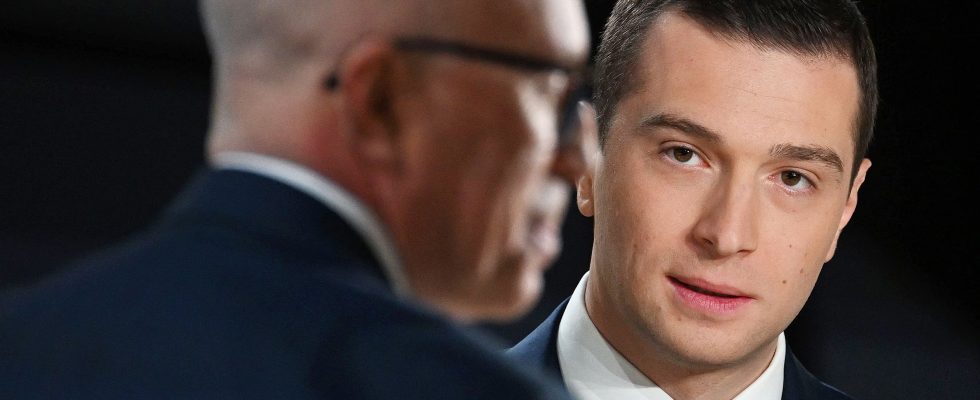What a painful birth! This Sunday, December 3, Aurélien Pradié comments on X (ex-Twitter) the attack in Paris, perpetrated the day before near the Eiffel Tower. The LR deputy from Lot tries three times to find the right words. He first warns of the “abandonment of psychiatry” and the shortcomings of the “S file”. Then modify the message once, and republish it. He then cites the failures of the S file, and concludes: “Everything has been abandoned. Psychiatry, constraint, our security.” In the third version, psychiatry simply disappeared. “Our country is a land of radicalization. Small steps are cowardice,” concludes the text with a security tone. 180 degree turn. In the meantime, the former number 2 of LR was attacked by users of the social network. In their eyes, psychiatry is just a convenient diversion to evacuate the jihadist threat.
The alleged perpetrator of the Paris attack has a hybrid profile. Armand Rajabpour-Miyandoab was listed for Islamist radicalization (FSPRT) and suffering from psychiatric disorders. Ideological motivations and mental illnesses intertwine in an explosive cocktail, observed during numerous Islamist attacks. “Between 25% and 40% of people followed for radicalization are affected by mental illnesses,” assures Figaro Gérald Darmanin, in favor of public authorities being able to require an “injunction for care for a radicalized person being monitored for psychiatric disorders”. The Minister of the Interior deplores “a failure” in the psychiatric follow-up of the attacker, a way of exonerating his services.
“I don’t want us to hide the radical Islam debate”
Psychiatry and terrorism. The equation is complex. Its subtlety does not suit the temptation of a unequivocal explanation of the attacks, as the latter is a cultural war. Each camp wants to impose its ideological reading of the attack so that it reinforces its political discourse. Thus the National Rally (RN) evacuates the psychiatric subject to better denounce immigration and the Islamist threat. “I don’t want us to hide the debate about radical Islam behind that of psychiatric instability,” its president Jordan Bardella said on Sud Radio.
At the opposite, Jean-Luc Mélenchon, keen to avoid any confusion between Muslims and Islamism, highlighted on X “the collapse of the psychiatric system”. Without saying a word about the ideology guiding the alleged terrorist, who pledged allegiance to the Islamic State (IS) group. Here, psychiatry is an obstacle to be removed. There, a shield to brandish.
Nothing new. The psychiatric issue has arisen in several common crimes or attacks that have been dealt with by anti-terrorism justice in recent years, such as at the Paris police headquarters (October 2019) or Rambouillet (April 2021). This matter is ambivalent. Improving the “psychiatric system” is a consensual objective, not very divisive and therefore without political force. However, this subject is linked to hot topics, such as insecurity, Islamism or immigration. Hence the accusations of denial from the far right, which only sees this subject as brushing aside other issues. “The left says that the subject is not security but the lack of means for psychiatry to minimize wildness, theorized Stanislas Rigault, close to Eric Zemmour, in the spring. Our goal is to say that we are in a countries where savagery is raging and to prioritize the problems.”
Behind psychiatry, hot topics
So it is, psychiatry is not the best subject to show off muscles. In November 2008, a patient escaped from a psychiatric ward before stabbing a young man to death in the streets of Grenoble. In response, Nicolas Sarkozy unveils a “plan for securing psychiatric hospitals” involving the multiplication of confinement structures. “His response ignored psychiatry, remembered this summer the PS deputy for Essonne Jérôme Guedj. But the complex questioning on the causes of violence or the context is experienced as an exoneration at a time when emotion demands a response from protection.”
Fifteen years later, this demand for protection has not weakened. The political scene, on the other hand, is more polarized. A left-right divide emerges in reference to psychiatric issues. On October 14, 2022, Lola was murdered in Paris. The main suspect in the murder of the teenager is an Algerian subject to an obligation to leave French territory (OQTF). The right points out the low rate of execution of these removal measures, while part of the left focuses on the psychiatric profile of the accused.
The knife attack on children in Annecy by a Syrian shouting “in the name of Jesus Christ” in June 2023 awakens the caesura. The right is calling for an overhaul of our asylum policy, LFI mentions “the problem of mental health in France”. Here again, the border between psychiatry and terrorism, imbued with subjectivity, is blurred. “If the guy had shouted ‘Allah Akbar’, the national anti-terrorist prosecution would have taken action,” noted a former Minister of the Interior at the time. This vagueness generates fewer nuances than clear-cut positions. When a crime or an attack is difficult to explain, each side can impose its views. “After Lola or Annecy, the guy on the right will talk about immigration, the guy on the left will talk about the misery of psychiatry. We must in reality talk about both subjects, and seize the opportunity to look at what we would not spontaneously want to look at,” judges Jérôme Guedj. The battle of the story does not encourage these concessions.
.
